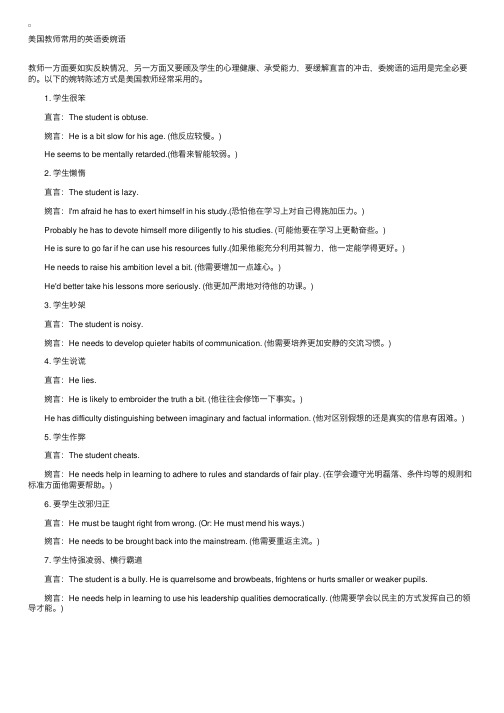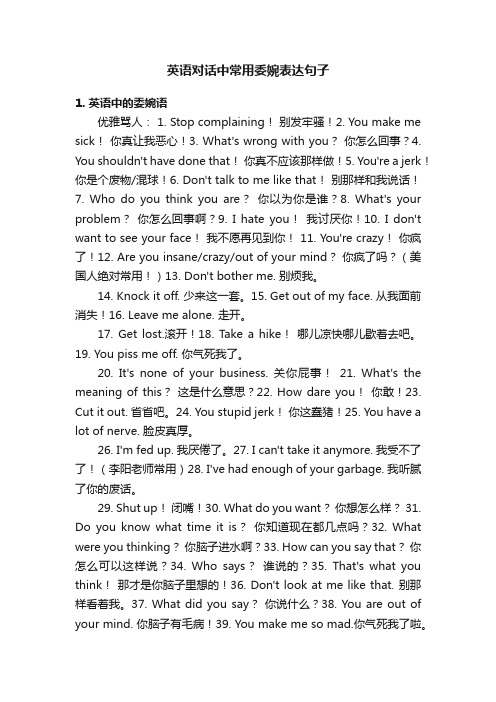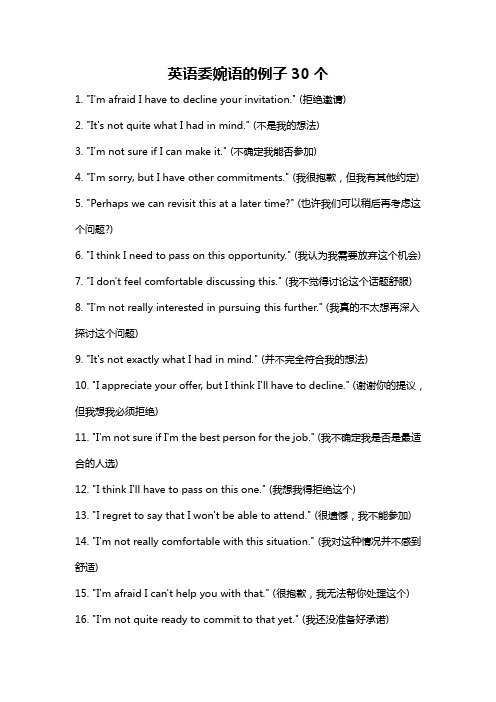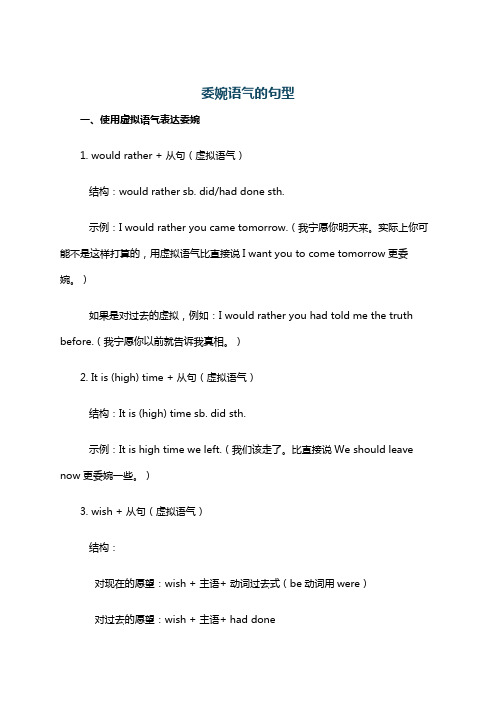英语委婉语的例子经典
美国教师常用的英语委婉语

美国教师常⽤的英语委婉语教师⼀⽅⾯要如实反映情况,另⼀⽅⾯⼜要顾及学⽣的⼼理健康、承受能⼒,要缓解直⾔的冲击,委婉语的运⽤是完全必要的。
以下的婉转陈述⽅式是美国教师经常采⽤的。
1. 学⽣很笨 直⾔:The student is obtuse. 婉⾔:He is a bit slow for his age. (他反应较慢。
) He seems to be mentally retarded.(他看来智能较弱。
) 2. 学⽣懒惰 直⾔:The student is lazy. 婉⾔:I'm afraid he has to exert himself in his study.(恐怕他在学习上对⾃⼰得施加压⼒。
) Probably he has to devote himself more diligently to his studies. (可能他要在学习上更勤奋些。
) He is sure to go far if he can use his resources fully.(如果他能充分利⽤其智⼒,他⼀定能学得更好。
) He needs to raise his ambition level a bit. (他需要增加⼀点雄⼼。
) He'd better take his lessons more seriously. (他更加严肃地对待他的功课。
) 3. 学⽣吵架 直⾔:The student is noisy. 婉⾔:He needs to develop quieter habits of communication. (他需要培养更加安静的交流习惯。
) 4. 学⽣说谎 直⾔:He lies. 婉⾔:He is likely to embroider the truth a bit. (他往往会修饰⼀下事实。
) He has difficulty distinguishing between imaginary and factual information. (他对区别假想的还是真实的信息有困难。
英语中委婉语气的表达法

英语中委婉语气的表达法在每一个民族的语言里,或多或少有些关于更礼貌更客气的表达方法,也就是委婉语气表达( overtone of politeness)。
西方人的委婉更是出了名的,英语学习者经过长期的英语学习和研究不难发现英语中有许多婉转口气的表达法,它使听话者觉得说话者更有涵养或更容易接受其内容,也使自己显得更有教养。
那么如何讲有礼貌的英语呢?下面就用一些例子对此做一些阐述。
1 有关请求和命令的婉转说法这一类言语行为在不同程度上具有冒犯性,因此需要用礼貌的话把它淡化和缓解。
试比较:● Pass the water.(不礼貌 )● Pass the water, please.(使对方容易接受。
)● Would you pass the water?(试探受话人是否乐意)● Could your possibly pass the water?(询问受话人是否有做某事的可能性,很客气)● I would be extremely grateful if your would pass the water.(假设语气陈述句,很有礼貌)● I wonder if you would be good enough to pass the water.(假设语气,很委婉)受话人如何给对方答复,现分肯定回答和否定回答来研究。
肯定回答:按礼貌程度由低到高排列。
● O.K.● (Yes,) certainly.● Yes, by all means.● Of course. I'll be only too pleased to.否定回答:当你被别人邀请参加聚会或其他等等活动而你因有事不能参加;或者人家有事相求你又确实帮不了,请求得不到满足,回答使发话人不悦,这时你不妨试试下面这些软否定:No, I'm afraid I can't; Well, I'd love to, but actually, I'm afraid I can't at present because...; I wish I could, but...; I'd love to, but...; I'd be glad to, but...; I'm afraid not, ...; It's very kind of you to say, but ...; I'd like to ..., but ...,etc. 让我们用一些对话做为例子 :● A: We plan to go to the beach after class, want to come?B: I'd love to, but Pro. Jones wants to speak with me.● A: It never fails, It's raining hard outside and I'm stuck without an umbrella.B: I'd like to let you have mine, but I have to go out soon.● A: Will you go to the movies with me tonight?B: I'd love to, but I've caught a cold.● A: Could you possibly do me a favor?B: Sure, What is it?A: I've got a problem. I have to fix my table and I don't have a hammer. Could I possibly borrow yours? B: I'm sorry. I'm afraid I don't have one.A: Oh .Do you know anybody who does?B: Yes. You should call Charlie. I'm sure he'll be happy to lend you his.A: Thank you. I'll call him right away.● A: It's such a fine day, shall we go to the park for a walk?B: I'd like to join you, but I find it chilly to walk outside in spite of the sun.2 劝告的婉转法试比较下面句子(按从直截了当到较有礼貌的含蓄的劝告表达法排列)● You ought to type this paper.(有强加于人的意向 )● You really should slow down at your office.● You'd better tell him the truth.● I'd advise you to take a vacation.● You should take your parents' advice, they know what's best for you.● If I were you , I'd buy another car without hesitation.(含蓄地达到劝告目的)3 建议的表达法试比较:● I suggest you go for some advice.(不够礼貌,用于熟悉的人 )● I would suggest starting the work at once.(较委婉)● You can read the novel now if you like.(给人选择余地,较客气)● You could/might have a look at the novel.(客气)● Why not call me next weekend?(有礼貌的建议)● Why don't you find a decent job?(同 5))● Can /may/Could/might I suggest that...?(使受话人容易接受)● It would be better if you copy that again.(假设条件句,容易使人接受)● I wonder if I might make the suggestion that...(用在正式场合,比如外交家的审慎的辞令风格)4 如何利用某些时态婉转地表达自己种种想法从上面所举例子,我们不难发现英语中有些时态其实并不表示真正的时态,而是与英语中的委婉语气密不可分的,例如:4.1 某些实意动词( want, wonder, think, hope等)的过去时、现在进行时、过去进行时表现在时比直接用现在时态更婉转,如:● A: Did you want me?B: Yes, I wondered if you could give me some help.● It's time you had a holiday.● I wish you lived closer to us.● If only you lent your book to me.● I'm hoping you'll give us some advice.● I'm wondering if I may have a word with you.● I was wondering /wondered if you'd like to come out with me one evening.● I was hoping / hoped you could send me some books.上面所举例子实际上都可以用一般现在时来代替,但是就不如用一般过去时;现在进行时或过去进行时委婉。
英语对话中常用委婉表达句子

英语对话中常用委婉表达句子1. 英语中的委婉语优雅骂人: 1. Stop complaining!别发牢骚!2. You make me sick!你真让我恶心!3. What's wrong with you?你怎么回事?4. You shouldn't have done that!你真不应该那样做!5. You're a jerk!你是个废物/混球!6. Don't talk to me like that!别那样和我说话!7. Who do you think you are?你以为你是谁?8. What's your problem?你怎么回事啊?9. I hate you!我讨厌你!10. I don't want to see your face!我不愿再见到你! 11. You're crazy!你疯了!12. Are you insane/crazy/out of your mind?你疯了吗?(美国人绝对常用!)13. Don't bother me. 别烦我。
14. Knock it off. 少来这一套。
15. Get out of my face. 从我面前消失!16. Leave me alone. 走开。
17. Get lost.滚开!18. Take a hike!哪儿凉快哪儿歇着去吧。
19. You piss me off. 你气死我了。
20. It's none of your business. 关你屁事!21. What's the meaning of this?这是什么意思?22. How dare you!你敢!23. Cut it out. 省省吧。
24. You stupid jerk!你这蠢猪!25. You have a lot of nerve. 脸皮真厚。
26. I'm fed up. 我厌倦了。
解密英语中的委婉语范本一份

解密英语中的委婉语范本一份解密英语中的委婉语 1委婉语起源于远古,维多利来女王时代中期为其鼎盛时期,在现代英语中,其出现频率依然颇高,因为人们通过委婉语,可以用温顺悦耳的`词语去谈论或叙述一些原来令人不快或逆耳之事物。
为此,他们用domestic help, day help或live-in help代替mail或servant(佣人); 以custodian或superintendent替代doorkeeper, caretaker或janitor(看门人或管理人);用She has a tile loose或She has a cylinder missing去代替She is crazy或She is not right in the head(神经失常)。
委婉语多如恒河沙数,不胜枚举,在此略举数例,以见一斑:原称委婉语无线电修理工radio electrician——radio doctor理发师barber——cosmotologist家庭妇女housewife——household executive收垃圾工人garbage collector——sanitary engineer老人old people——senior citizens再看两个委婉语的例子:Nowadays many weight-watchers would like to go to the gym。
如今有不少胖人喜欢到健身房去锻炼。
They are the culturally deprived。
他们是没有学识的人。
值得注意的是,委婉语虽然是“古已有之,于今为烈",但决不能用得过多过滥. 使用时要考虑场合和对象,如用得不得体,反而会使你"欲礼而不达",甚至令人不知所云,一头雾水。
You can find doctors and doctors in Hongkong!在__,既有好医生,也有坏医生。
英语委婉语的例子30个

英语委婉语的例子30个1. "I'm afraid I have to decline your invitation." (拒绝邀请)2. "It's not quite what I had in mind." (不是我的想法)3. "I'm not sure if I can make it." (不确定我能否参加)4. "I'm sorry, but I have other commitments." (我很抱歉,但我有其他约定)5. "Perhaps we can revisit this at a later time?" (也许我们可以稍后再考虑这个问题?)6. "I think I need to pass on this opportunity." (我认为我需要放弃这个机会)7. "I don't feel comfortable discussing this." (我不觉得讨论这个话题舒服)8. "I'm not really interested in pursuing this further." (我真的不太想再深入探讨这个问题)9. "It's not exactly what I had in mind." (并不完全符合我的想法)10. "I appreciate your offer, but I think I'll have to decline." (谢谢你的提议,但我想我必须拒绝)11. "I'm not sure if I'm the best person for the job." (我不确定我是否是最适合的人选)12. "I think I'll have to pass on this one." (我想我得拒绝这个)13. "I regret to say that I won't be able to attend." (很遗憾,我不能参加)14. "I'm not really comfortable with this situation." (我对这种情况并不感到舒适)15. "I'm afraid I can't help you with that." (很抱歉,我无法帮你处理这个)16. "I'm not quite ready to commit to that yet." (我还没准备好承诺)17. "I'm not sure that's the best approach." (我不确定那是最好的方法)18. "I don't think this is a good fit for me." (我觉得这不适合我)19. "I'm sorry, I can't make it." (对不起,我不能来)20. "I'd rather not discuss that." (我宁愿不讨论那个)21. "I'm not really looking for a change at the moment." (我现在并不是真的想要改变)22. "I don't think that's a good idea." (我不认为那是个好主意)23. "I'm afraid I have to disagree with you on that." (恐怕我必须在这个问题上与你不同意)24. "I may have to decline this offer." (我可能不得不拒绝这个提议)25. "I'm afraid I can't commit to that right now." (我恐怕现在不能承诺)26. "I'm not really comfortable with the terms." (我不太满意这些条款)27. "I'm afraid I don't have the time for that." (恐怕我没有时间做那个)28. "I don't think that's quite what I had in mind." (我认为那不是我想要的)29. "I'm not really sure what to think about this." (我不是很确定怎么看待这个)30. "I'm afraid I can't provide you with what you're asking for." (恐怕我不能提供你所要求的东西)。
委婉语气的句型

委婉语气的句型一、使用虚拟语气表达委婉1. would rather + 从句(虚拟语气)结构:would rather sb. did/had done sth.示例:I would rather you came tomorrow.(我宁愿你明天来。
实际上你可能不是这样打算的,用虚拟语气比直接说I want you to come tomorrow更委婉。
)如果是对过去的虚拟,例如:I would rather you had told me the truth before.(我宁愿你以前就告诉我真相。
)2. It is (high) time + 从句(虚拟语气)结构:It is (high) time sb. did sth.示例:It is high time we left.(我们该走了。
比直接说We should leave now更委婉一些。
)3. wish + 从句(虚拟语气)结构:对现在的愿望:wish + 主语+ 动词过去式(be动词用were)对过去的愿望:wish + 主语+ had done对将来的愿望:wish + 主语+ would/could/might+动词原形示例:I wish I were as tall as you.(我希望我和你一样高,表达一种委婉的愿望,因为实际上并非如此。
)I wish I had studied harder when I was at school.(我希望我上学的时候能更努力学习。
)I wish it would stop raining tomorrow.(我希望明天雨能停。
)二、使用情态动词表达委婉1. could/might在请求别人做某事时,使用could或might比使用can或may更委婉。
示例:Could you pass me the salt?(比Can you pass me the salt?更礼貌、委婉。
英语委婉语
(1)英语中委婉语(一)有关“死亡”的委婉语人们生活中最忌讳的就是死亡,因此语言禁忌中关于死亡的委婉语大量存在。
如:pass away(逝世),be no more(不在了),depart(去世),be gone(走了),join the majority(会见老祖宗去了),go to west(归西了),go to glory(升天了),go to meet one maker(见上帝),to be at peace(平静了),the final departure(最后离去),final sleep(最后一觉),to go to one S long home(回到永久之家),to have found rest(得到安息),in heaven(在天堂),with God(和上帝在一起)等。
与之相对,汉语中有:“去世了”“仙逝了”,“到极乐世界去了”,“逝世”,“谢世”“过世”,“下世”,“不在了”,“走了”,“过去了”,“离开了我们”,“毙命”,“归天”,“长眠”,“与世长辞”对特殊人物还有专门的术语,如:和尚死了叫“圆寂”,皇帝死了叫“驾崩”,诸侯死了用“功甍”,妻子死了叫“断弦”,为了守节而死叫“玉碎”,执行公务而死叫“殉职”,为正义而死叫“牺牲”等。
“死亡的委婉说法还有:to be ;present at the last roll call 出席最后一次点名to be written off被勾销 t0 fall 倒下 to fire one s last shot射出最后一发子弹It S taps.熄灯号音响了to hy down one S life 放下自己的生to make the ultimate sacrifice最后的牺牲to do one S bit 尽自己的本分这些委婉语听起来很平淡,几乎无法使人联到军人那悲壮而惨烈的死。
(二)有关“疾病”的委婉语生病也是人们忌讳说的,因而东、西方人都常常用替代形式来淡化表达。
英语中10句温柔、委婉的表达方式
英语中10句温柔、委婉的表达方式某些话题我们在中文环境里懂得委婉表达,但是到了英语环境里却怎么也想不起来!下面是麦田君整理了英语中10句温柔、委婉的表达方式,教你如何说出那些难以启齿的表达。
1.You're gonna hate me for this...你不会喜欢这个……真实含义:Because I'm about to say something horrible.因为我要告诉你一些可怕的事情。
2.How do I put this gently...我要怎么才能温柔地告诉你……真实含义:This is going to hurt.下面我要说的可能比较伤人。
3.No offense, but...不是想冒犯您,但是……真实含义:I'm going to say something offensive.我要说一些冒犯你的话了。
4.We need to talk...我们需要谈谈了……真实含义:About something you don't want to talk about.谈的是一些你不想谈的事情。
5.I hate to break it to you...我很不愿意让你知道这个消息……真实含义:But prepare to be broken.但做好崩溃的准备吧。
6.Well, if you want the truth...好吧,如果你想听真话……真实含义:I've been lying this entire time.我其实一直在撒谎。
7.I'm not trying to be mean...我不想那么刻薄……真实含义:But I'm about to destroy you.但是我要开始打击你了。
8.Yeah, about that...关于那件事……真实含义:Everything we discussed is off the table.所有我们讨论过的事就不再说了。
表示委婉请求的英语句子语录带翻译
表示委婉请求的英语句子语录带翻译委婉语是一种普遍的语言现象,是日常交际中改善交际效果、维持和谐人际关系的重要手段。
下面是店铺带来的表示委婉请求的英语句子,欢迎阅读!表示委婉请求的英语句型篇一1. Would you mind + doing …? 你介意……吗?请你……可以吗?需注意:mind + doing(为动名词)。
动名词的否定式由“not + 动名词”构成。
即Would you mind not doing…?请不要……好吗?例如:Would you mind moving your bike? 请把你单车挪动一下好不好?---Would you mind cleaning your room? 打扫房间你介意吗?---I am sorry. I’ll clean it in a minute. 对不起,我马上就去做。
---Would you mind not wearing the old jeans? 不穿旧的牛仔裤好吗?---OK, I’ll put on another pair. 好,我将穿另一条。
---Would you mind not playing football here?请不要在这儿踢足球好吗?---I’m sorry. 对不起(当然不介意)。
2. would的常用句型:would作为情态动词,主要用于第二人称的疑问句中,表示询问对方的意愿或者向对方提出请求,时间指现在或者将来。
would的语气要比will更加婉转和客气。
常用的句型除“Would you mind doing…?”之外,还有:1. Would you please…? 请……可以吗?2. Would you like…? 需要……吗?3. Would you like to…? 你愿意……吗?4. Could you please do something? 请你做某事可以吗?5. What about doing …? ……怎么样?6. Shall we do …? 我们做……吧?7. You’d better do…. 你最好做……。
英语委婉语词典
英语委婉语词典收录了大量常用的英语委婉语,可以帮助读者了解英语语言中表达礼貌和避免冒犯他人的常用词汇和表达方式。
以下是一些常见的英语委婉语:
"deceased":已故的,代替"dead"
"temporarily challenged":有残疾的,代替"handicapped"
"differently abled":有特殊能力的,代替"disabled"
"final resting place":坟墓,代替"grave"
"ironing board":铁板,代替"flat iron"
"weight-watcher":减肥者,代替"obese person"
"WC":洗手间,代替"toilet"
"charm offensive":花言巧语,代替"lying"
"potting shed":卫生间,代替"toilet"
"comfort station":公共厕所,代替"public restroom"
以上仅是一些常见的英语委婉语示例,实际上英语委婉语的数量非常庞大,而且随着时代的变化和语境的不同,委婉语的用法也在不断变化。
- 1、下载文档前请自行甄别文档内容的完整性,平台不提供额外的编辑、内容补充、找答案等附加服务。
- 2、"仅部分预览"的文档,不可在线预览部分如存在完整性等问题,可反馈申请退款(可完整预览的文档不适用该条件!)。
- 3、如文档侵犯您的权益,请联系客服反馈,我们会尽快为您处理(人工客服工作时间:9:00-18:30)。
英语委婉语的例子经典
1. "I'm afraid that won't be possible." (我恐怕这不太可能。
)
2. "Perhaps we could explore some other options." (或许我们可以考虑其他的选择。
)
3. "I'm sorry, but that's not quite what I had in mind." (很抱歉,但那不是我想要的。
)
4. "I'm not sure that's the best approach." (我不确定那是最好的方式。
)
5. "It sounds like we have some differences in opinion." (听起来我们在看法上有些不同。
)
6. "I appreciate your input, but I'll need some more time to consider it." (感谢你的建议,但我需要更多时间来考虑它。
)
7. "It's not that I don't trust you, but I prefer to err on the side of caution." (不是我不信任你,但我更倾向于谨慎小心。
)
8. "I'm sorry, but I'm going to have to decline your invitation." (很抱歉,但我必须拒绝你的邀请。
)
9. "I'd love to help, but I'm afraid I'm not available right now." (我很想帮忙,但我恐怕现在没有时间。
)
10. "Let's revisit this conversation at a later time." (让我们在以后的时间重
新讨论这个话题。
)。
